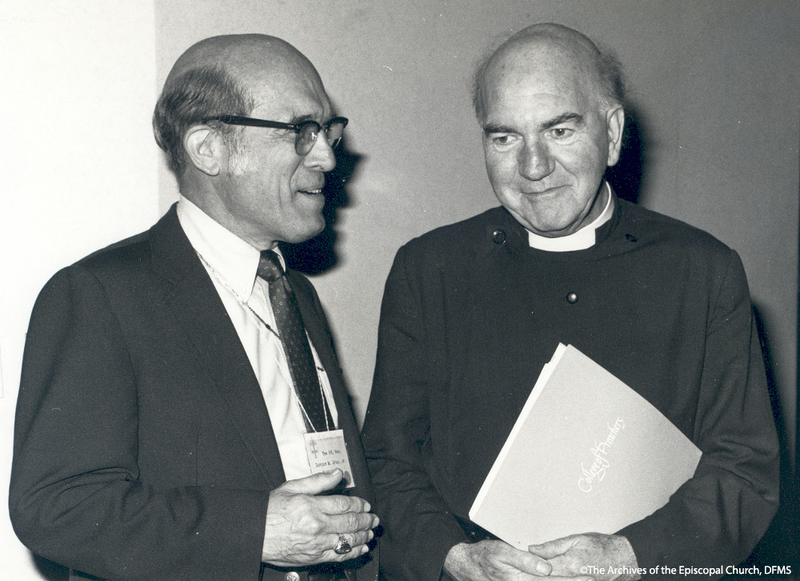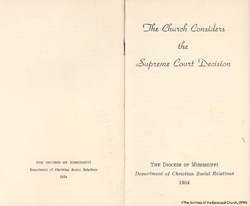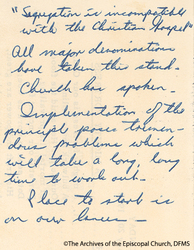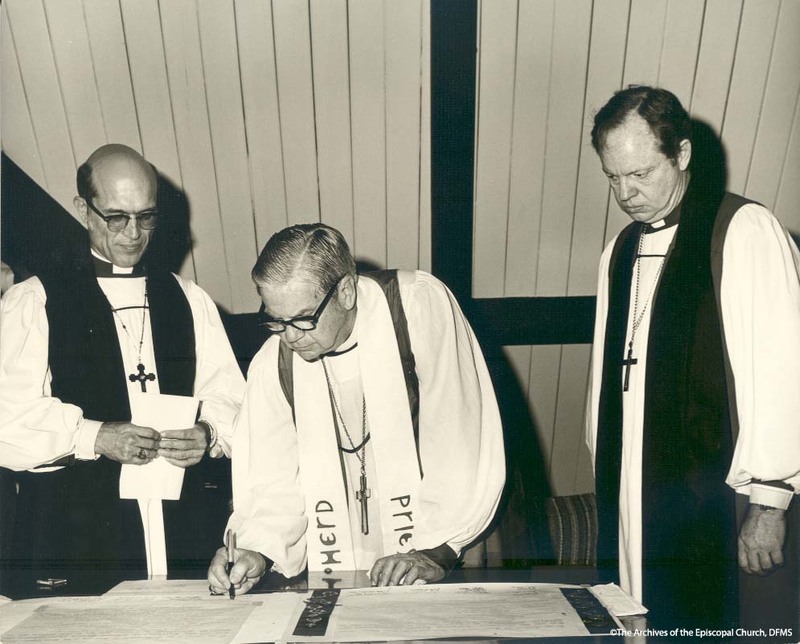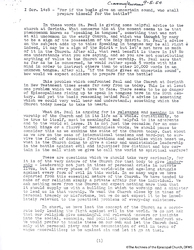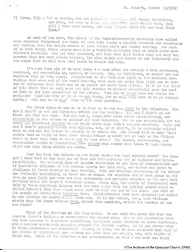Leadership Gallery
The Right Reverend Duncan Montgomery Gray, Jr., 1926-2016
For these are times which not only try men’s souls, but also infect and poison them. The seeds of anger and hatred, bitterness and prejudice, are already widely sown, and as Christians, we need to do our utmost to uproot and cast them out.
- Duncan Montgomery Gray, Jr.
Bishop Gray (left) and his mentor, Anglican theologian and Episcopal priest, Reverend Canon John Macquarrie, 1983.
These words resounded from the pulpit of Duncan Montgomery Gray on Sunday, September 30, 1962 as a racial storm outside the walls of his Oxford, Mississippi church gained momentum. Gray’s prophetic reflections did not keep well with Southern mores in an era and place defined by segregation, but they epitomized Gray’s sentiment towards racism.
Duncan Montgomery Gray was born in Canton, Mississippi on September 21, 1926 to the Reverend Duncan Montgomery Gray and Isabel McCrady. He attended high school in Greenwood, Mississippi before graduating in 1944 from Central High in Jackson. Upon graduation, he entered the Navy and was sent to Tulane University on the Navy-12 Program. Gray spent approximately one year as a commissioned officer in the Navy before receiving his Bachelor of Electronic Engineering in 1948 from Tulane. That same year he married Ruth Spivey of Canton with whom he had four children.
Gray began a secular career at Westinghouse Corporation. After completing almost three years there, he made the decision to leave a promising future and enter the seminary. In 1953 he graduated with a Bachelor of Divinity from the University of the South, Sewanee, the same institution that awarded him an Honorary Doctor of Divinity in 1972, a rare honor bestowed upon a parish priest. While in seminary, Gray traveled to Cuba where he learned first hand about poverty and race in a setting outside the American apartheid system. The experience reconfirmed his decision to become a priest and further strengthened his commitment to social reform. Bishop Duncan Montgomery Gray I, Gray’s father and the fifth bishop of Mississippi, ordained his son to the diaconate April 8, 1953 and to the priesthood in October.
The document entitled, "The Church Considers the Supreme Court Decision" drafted by Gray and authored by the Diocese of Mississippi's Department of Christian Social Relations, 1954.
Bishop Gray's note from February 20, 1958 for an unplanned address to an ecumenical group outlining his speech at Mississippi State University later that week. The media controversy surrounding Gray's views on race resulted in the University cancelling his talk.
As a fourth generation Mississippian, Duncan Gray, Jr. devoted his pastoral career to the parishes and communities of Mississippi. Between 1953 to 1960, he served as priest-in-charge at the parishes of Grace Church in Rosedale, Calvary Church in Cleveland, and Church of the Holy Innocents in Como. Gray’s next assignment brought him to Oxford where he served as the chaplain to the Episcopal students at the University of Mississippi until 1961 and as rector to the parishioners of nearby St. Peter’s Church from 1957 to 1965. As one of the few white citizens who so bravely confronted racism, it was in Oxford that Gray earned both the respect and the contempt that would shape his legacy as a civil rights advocate within the Episcopal Church.
The University of Mississippi’s decision in September 1962 to enroll the school’s first African American student, James Howard Meredith, became a definitive moment in Gray’s lifelong dedication to improving the lives of the abandoned Black minority. The admittance of Meredith stirred the racist emotions of not only the campus community but the hatred of people in the surrounding states. As the violence of protestors continued to swell, Gray boldly attempted to calm the crowd of rioters as he clung to the Confederate statue in the campus square, but was ultimately absorbed into the crowd. Although Gray was not able to squelch the entrenched racism embodied by the unrestrained mob, the event did not extinguish his faith and his commitment to inclusion.
After Oxford, Gray served as rector at St. Paul’s in Meridian until 1974 when he was elected to the episcopate as the Bishop of Mississippi, a position he held for twenty years. Gray was a controversial leader who was elected to represent a state still enmeshed in discrimination at a turbulent time in the Church when two historical issues were being disputed: the revision of the 1928 Book of Common Prayer and the ordination of women. Bishop Gray supported these efforts but carried forward, in his markedly dignified and persistent manner, a progressive stand on what he considered the Church’s and the nation’s greatest obstacle - racism.
At the time of his election to the episcopate in 1974, Gray was serving the diocese as vice-president of the Diocesan Executive Committee and chairman of the Commission on Ministry. His other diocesan commitments have included roles as chairman of the Mississippi Religious Leadership Conference; president of the Standing Committee; dean of the Board of Examining Chaplains; and chairman of the departments of College Work, Christian Education, Communications, and Christian Social Relations.
The Reverend Duncan Montgomery Gray, Jr. (left), Presiding Bishop John Hines (center), and Bishop of Mississippi John Allin (right) at Gray's consecration as bishop coadjutor, 1974.
Gray was one of the few members that comprised the diocesan department of Christian Social Relations in 1954 when the U.S. Supreme Court ruled that segregation in public schools was unconstitutional. In accordance with his belief that the Church is a primary instrument in social change, Gray urged the diocese to take a stand on segregation as the racial discord in Mississippi continued. Gray took it upon himself to draft the radical document entitled, “The Church Considers the Supreme Court Decision” in which Gray used biblical references to support his argument that racial segregation was a sin. It was ultimately affirmed by his father Bishop Gray, published in the diocesan newspaper, and shared with the media and elected officials of Mississippi. The diocesan declaration was considered to be heretical by many.
Bishop Gray concentrated his ministry on local and statewide communities. He served as a board member and president (1963-1967) of the Mississippi Council on Human Relations; member of the Mississippi Advisory Committee to the U.S. Commission on Civil Rights; member of the Southern Regional Council (1967-1973); member of the Committee of Southern Churchmen and member of the committee’s journal editorial board (1963-1980); chairman of the County Advisory Board of the Mississippi Action for Progress (1967-1971); board member and chairman of the Meridian Counseling Foundation; and chairman of the Title I Advisory Committee of the Meridian public schools. His other school-related associations include: member and past chairman of the Board of Trustees of All Saints’ Episcopal School, Vicksburg; Board of Regents (1981-1987) and Board of Trustees (1974-1997) member and chancellor of the University of the South (1991-1997).
Bishop Gray also served the Church as chairman (1977-1983) and member (until 1986) of the General Convention’s Standing Commission on Constitution and Canons and as chairman of the House of Bishops’ Committee on Canons (1975-1988) and Committee on Rules. For three terms he held the position of vice chairman of the Board of The Archives of the Episcopal Church (1985-1994) and fulfilled duties as deputy to four General Conventions.
Gray made equality and fairness central to his life’s work in spite of resistance, consternation, and disapproval. He and Mrs. Gray continued to serve their local parish in retirement, and their son, Duncan Gray, III, was the Bishop of Mississippi until 2015.
Duncan Gray, Jr., passed away on July 15, 2016. His life story is told eloquently by his biographer, Will D. Campbell, who attributed Gray’s support of social justice to the “the radicalism of liturgy.” [Sources]


